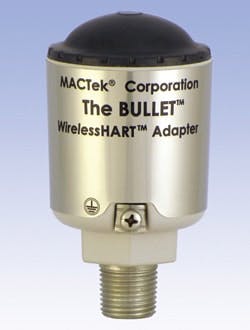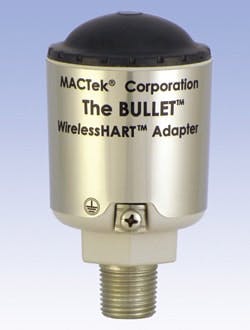The Bullet WirelessHART Adapter Ships with New Features
The general-purpose version of the Bullet will ship by the end of June. The Bullet makes wired HART devices wireless and it can also make analog (non-smart) instruments wireless. Wired HART field devices fitted with a Bullet com-municate their process variables (PV) over existing wiring to the DCS and simultaneously send the PVs, diagnostics and alarm data over the WirelessHART network to process control, asset management and engineering applications. Analog-only instruments fitted with a Bullet wirelessly report their PV data over the WirelessHART network too. The Bullet provides an alternate path for digital device information, so users can benefit from it without disrupting existing analog wiring or upgrading control system I/O.
The Bullet's unique multi-drop capability allows up to eight devices to be hooked up to one adapter. "You can have complete updates from all eight devices in just eight seconds," says Holmes.
Its multi-drop capability also makes the Bullet uniquely cost-effective. The digital multi-drop feature brings the cost of adding devices to an existing WirelessHART network well below that of other digital busses that require a linking device, wire, power conditioners and segment protectors, as well as training for personnel.
The Bullet is loop-powered, requiring no batteries or other power sources. It connects directly to existing HART or analog-only field devices or, optionally, anywhere on the 4-20 mA loop. Featuring MACTek's patent-pending StepVolt technology that sets insertion voltage in steps from 1 V to 2.5 V, the Bullet optimizes the trade-off between available loop power and wireless communication bandwidth.
The Bullet may be connected to optional external power; i.e., line power, battery or solar, as necessary for some applications. Its unique power- cycling feature cycles power to attached devices, extending battery life, an advantage for solar- and battery-powered installations. When powered externally, the Bullet provides the load resistor required by the HART protocol, saving users the time and cost of installing and wiring an external resistor in the field wiring.
The Bullet is easy to install permanently by screwing it directly into an available spare port of a HART field device or by using a close-coupled, right-angle elbow condolet. Other installation options are possible anywhere on the loop using junction boxes or tee fittings.
"There is a threaded connection at the bottom of the Bullet," explains Holmes. "You thread the connection into the port and hook up the wires. It only takes a matter of minutes. You can have an entire network up and running in no time at all."
The Bullet's low cost and flexibility make it ideal for getting at stranded data. "Most plants are getting very little of the data their HART devices can deliver because 90% of the control systems are analog-only," says Holmes. "The Bullet can provide access to this data."
Furthermore, the Bullet makes it easy to get new measurement points. "This is the feature that customers really like," says Holmes. "They're saying to us, ‘We have measurements we'd like to make, and WirelessHART can help us get them.' You can take any vendor's HART transmitter, add an adapter, and install it without wires as a new measurement point. We see this as an area where there's going to be a lot of customer demand. For example, Coriolis flowmeters and multi-variable pressure transmitters can now provide all their variables over the WirelessHART network, allowing users to tap into existing measurements at the lowest possible cost."
In addition to the general-purpose version, the Bullet will be available in both intrinsically safe and explosion-proof versions. The intrinsically safe version is scheduled to ship by the end of the third quarter and the explosion-proof version in the fourth quarter.


